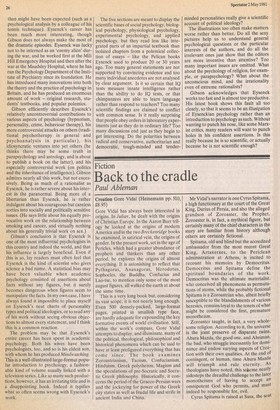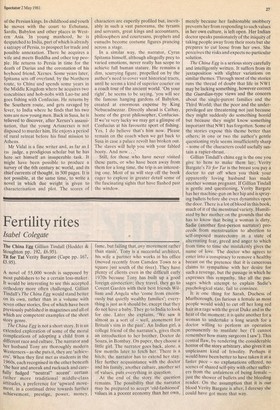Fiction
Back to the cradle
Paul Ableman
Creation Gore Vidal (Heinemann pp. 510, £8.95) Gore Vidal has always been interested in origins. In Julian, he dealt with the origins of Christian Europe. In the Aaron Burr trilogy he looked at the origins of modern America andiin the two Breckenridge books he examined, in satirical vein, the origins of gender. In the present work, set in the age of Pericles, which had a greater abundance of prophets and thinkers than any other period, he explores the origins of almost everything. It is astonishing to reflect that Pythagoras, Anaxagoras, Herodotus, Sophocles, the Buddha, Confucius and Lao-tse, to mention only some of the most august figures, all walked the earth at about the same time.
This is a very long book but, considering its vast scope, it is not nearly long enough. Even 500 densely-packed, large-format pages, printed in smallish type face, are hardly adequate for expounding the key formative events of world civilisation. Still, within the work's compass, Gore Vidal attempts to display, and illuminate, many of the political, theological, philosophical and historical phenomena which can be said to have at least prefigured everything that has come since. The book examines Zoroastrianism, Taoism, Confucianism, Hinduism, Greek polytheism, Magism and the speculations of pre-Socratic and Socratic Greek philosophy. Historically, it concerns the period of the Graeco-Persian wars and the jockeying for power of the Greek city states as well as feudal life and strife in ancient India and China. Mr Vidal's narrator is one Cyrus Spitama, a high functionary at the court of the Great King, Darius of Persia, and also the alleged grandson of Zoroaster, the Prophet. Zoroaster is, in fact, a mythical figure, but certainly many of the chief characters in the story are familiar from history although others are certainly fictional.
Spitama, old and blind but the accredited ambassador from the most recent Great King, Artaxerxes, to the Periclean administration at Athens, is incited to recount his memoirs by Democritus. Democritus and Spitama define the spiritual boundaries of the work. Democritus was the ultimate materialist, who conceived all phenomena as permutations of atoms, while the probably fictional Spitama is a Zoroastrian who, albeit briefly susceptible to the blandishments of various heresies, remains loyal to the tenets of what might be considered the first, premature monotheism.
Zoroaster taught, in fact, a very wholesome religion. According to it, the universe is the joint preserve of disparate twins, Ahura Mazda, the good one, and Ahriman, the bad, who struggle incessantly for dominance and endow varying aspects of Creation with their own qualities. At the end of contingent, or human, time Ahura Mazda will triumph and rule eternity. As theologians have noted, this scteme neatly sidesteps the dreadful challenge to the later monotheisms of having to accept an omnipotent God who permits, and must indeed be responsible for, evil. Cyrus Spitama is raised at Susa, the seat of the Persian kings. In childhood and youth he moves with the court to Ecbatana, Sardis, Babylon and other places in Western Asia. In young manhood, he is despatched to India, part of which is already a satrapy of Persia, to prospect for trade and possible annexation, There he acquires a wife and meets Buddha and other top people. He returns to Persia in time for the death of Darius and the coronation of his boyhood friend, Xerxes. Some years later, Spitama sets off overland, by the Northern route, to China and spends some years in the Middle Kingdom where he acquires two concubines and hob-nobs with Lao-tse and goes fishing with Confucius. He returns by the Southern route, and gets ravaged by fever, to India where he finds that his two sons are now young men. Back in Susa, he is relieved to discover, after Xerxes's assassination, that the young Artaxerxes is not disposed to murder him. He enjoys a period of rural retreat before his final mission to Athens.
Mr Vidal is a fine writer and, as far as I cai judge, a prodigious scholar but he has here set himself an insuperable task. It might have been possible to produce a survey of the 6th century ac world, and its chief currents of thought, in 500 pages. It is not possible, at the same time, to write a novel in which due weight_ is given to characterisation and plot. The scores of characters are expertly profiled but, inevitably in such a vast panorama, the tyrants and servants, great kings and accountants, philosophers and courtesans, prophets and eunuchs become costume figures prancing across a stage.
In a similar way, the narrator, Cyrus Spitama himself, although allegedly prey to varied emotions, never really has scope to achieve full human stature. He remains a dim, scurrying figure, propelled on by the author's need to cover vast historical tracts, until he seems a kind of superior courier on a coach tour of the ancient world. 'On your right', he seems to be saying, 'you will see the famous hanging gardens of Babylon, created at enormous expense by King Nebucadnezzar. Directly ahead is Cathay, home of the great philosopher, Confucius. If we're very lucky we may get a glimpse of Confucius at his favourite sport of fishing. Yes, I do believe that's him now. Please remain on the coach when we get back to Susa in case a palace revolt has broken out, The slaves will help you with your fabled booty. And now Still, for those who have never visited these parts, or who have been away from them for a long time, the trip is an interesting one. Most of us will step off the book eager to explore in greater detail some of the fascinating sights that have flashed past the window,



















































































 Previous page
Previous page